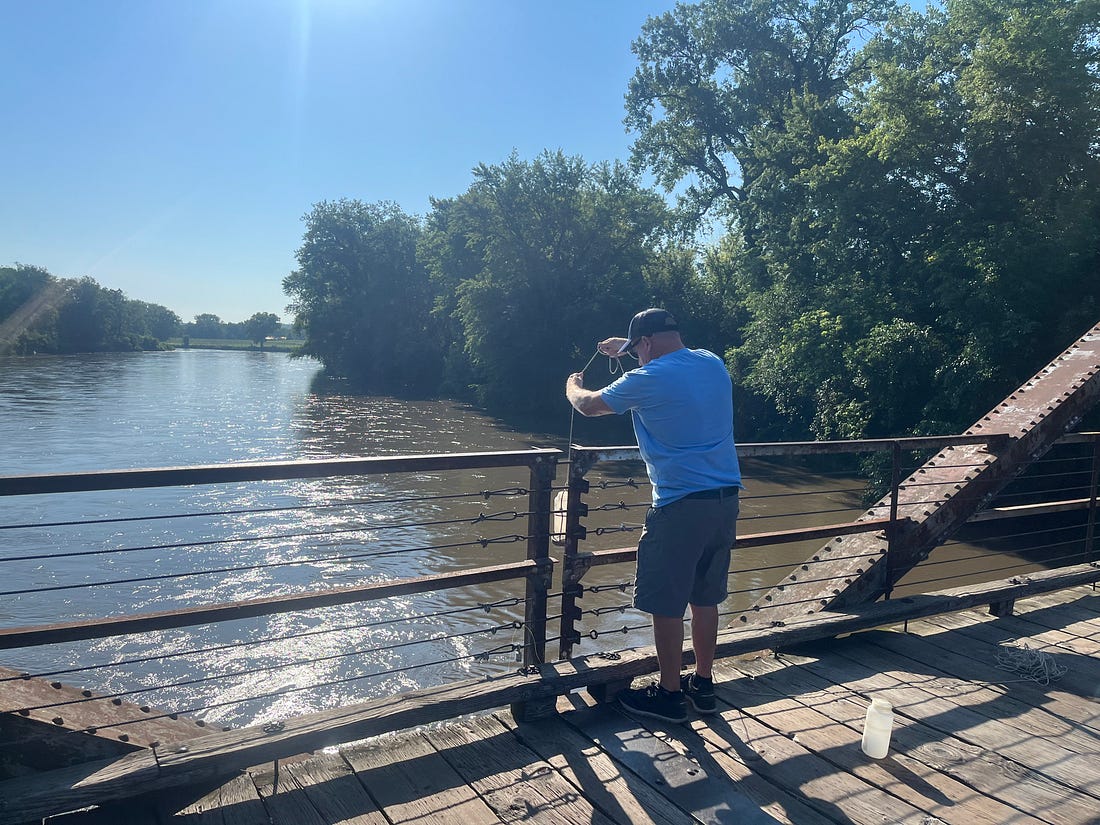Seeking a bridge over troubled waters – Iowa wrestles with drinking water pollution and mounting cancer cases.
͏ ͏ ͏ ͏ ͏ ͏ ͏ ͏
Seeking a bridge over troubled watersIowa wrestles with drinking water pollution and mounting cancer cases.carey gillam Aug 11  (Des Moines Water Works lab technician Bill Blubaugh draws water samples from the Raccoon River in Des Moines, Iowa. Aug. 5, 2025.) A week ago today I was driving through what has become a familiar landscape for me: the corn-covered fields of Iowa, one of America’s top farming states. Over the decades now that I’ve reported on US agriculture, I’ve trekked through literally hundreds of farm fields around the nation and been lucky enough to visit with a wide range of farmers who produce our food. Farmers work hard, sacrifice much and often receive too little in return, thanks to government programs and policies that reward the companies selling seeds and chemicals much more than the farmers who purchase and use them. I’ve written versions of that story many times. This visit to Iowa was different. The story is changing. The agricultural economy there is still strong, and the industry still wields great power both within the state and at the federal level. But an uprising appears to be underway. You see, Iowa is no longer rated as a national leader just in agriculture; over recent years it has emerged as a top state for cancer too. Leukemia, as well as cancers of the pancreas, breast, stomach, kidney, thyroid and uterus, are among the different cancer types on the rise across Iowa. Talk to almost anyone in Iowa and they can tell you of the sorrow they feel for the suffering of a sister, brother, father, mother, friend or neighbor. And as research around the topic rolls in, it’s becoming increasingly apparent that farming bears part (some say a large part) of the blame for the epidemic of disease roiling the state. On my Aug 4-5 visit, I attended a gathering held at Drake University sponsored by the Harkin Institute, held for the sole purpose of detailing new data on the dangerously polluted state of Iowa’s drinking water. Scientists explained to an outraged crowd of more than 600 people how farm chemicals and waste from the state’s large livestock operations are mixing with other pollutants to endanger not just the waters that they fish and swim in, but also the water they drink. Many of the chemicals and other pollutants contaminating water sources are scientifically linked to the types of cancers plaguing Iowans, as well as other health problems. Nitrates, generated by fertilizer and manure, are a particular concern, routinely found in Iowa waters at levels above the 10 milligrams per liter federal regulators set as a safe standard. Babies are at risk for severe health problems when consuming nitrates in drinking water, and exposure to elevated levels of nitrates in drinking water has been linked by researchers to cancers of the blood, brain, breast, bladder and ovaries. Nitrate levels this summer in Iowa have been so far above federal standards that the utility serving 600,000 people in and around Des Moines restricted water use because the utility could not safely clear the high levels.  (Des Moines Water Works chemist Lisa Morarend tests water samples for nitrates and other pollutants. Aug 5, 2025.) Though the restrictions recently eased, on Aug. 5, the day after the forum, I accompanied a lab technician to gather water samples from the Raccoon River, one of the two main rivers that supplies the area’s drinking water. Testing of those samples later that morning by the Central Iowa Water Works in Des Moines showed unsafe levels of nitrates were persisting, and utility officials said they were drawing water from elsewhere for drinking water supplies. Agricultural pollution is not a new story by any means. But what I found new and noteworthy was the level of sheer anger expressed by so many citizens, including farmers who drove from hours away to attend the forum at Drake University. Over and over, people said they’ve had it with political leaders who look the other way and downplay how allowed agricultural practices, such as over-use of fertilizer, widespread use of toxic herbicides and other pesticides, and exorbitant generation of manure from livestock operations are wrecking both environmental and human health.  (More than 600 people attended an Aug. 4, 2025 forum on water pollution at Drake University in Des Moines, Iowa.) Citizens are banding together to form their own water monitoring brigades, amplify data about the pollution and its ties to agriculture, and to demand action from political leaders. It’s unclear yet as to whether or not the efforts will make a difference. But it is stirring to see the movement taking root. Iowans say they want a healthier future for their kids and grandkids. As should we all. When the forum concluded and the standing ovation of applause died down, organizers played the song Bridge Over Troubled Waters as the crowd filed out. To read more about this story, you can read this story, and this one, and this one. See The New Lede for more news You’re currently a free subscriber to UnSpun. For the full experience, upgrade your subscription. © 2025 carey gillam 548 Market Street PMB 72296, San Francisco, CA 94104 |